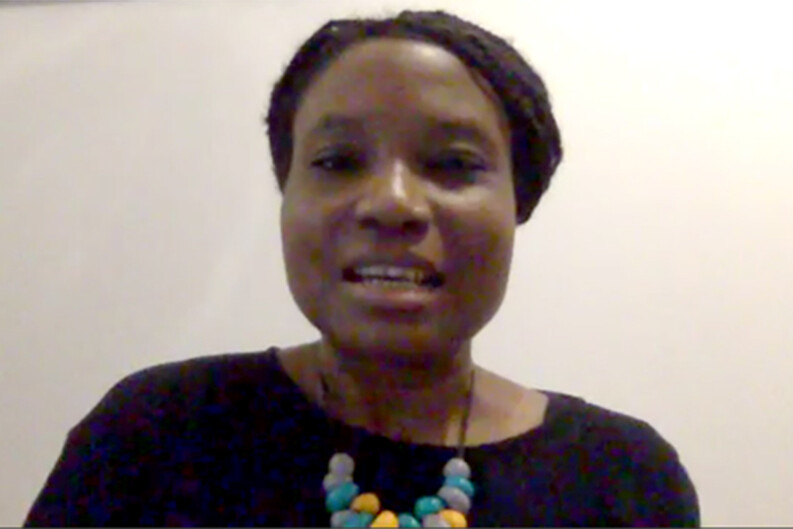Nosmot Gbadamosi Considers Sino-Africa Relations and Human Rights

The Orville H. Schell Jr. Center for International Human Rights4 welcomed Nosmot Gbadamosi to lead the Sept. 29 Human Rights Workshop5, “China’s Future in Africa in the New Cold War.” Gbadamosi, journalist and the writer of Foreign Policy’s Africa Brief column, discussed the human rights implications of the African continent’s uneven relationship with China.
According to Gbadamosi, the United States and other Western countries have long criticized China for engaging in “debt-trap diplomacy” with Africa through its Belt and Road Initiative, the massive economic development plan to connect Asia, Africa and Europe through overland corridors and maritime shipping lanes. She explained that Western countries invoke the term debt-trap to accuse China of making unsustainable loans to “make African states dependent and more compliant in siding with the Chinese Communist Party on global issues,” including Russia’s invasion of Ukraine.
However, Gbadamosi rejected the Western characterization of this relationship. Rather than preventing Chinese abuses, she said, such accusations have obscured human rights concerns with greater ramifications for the continent.
Contrary to the portrayal in the West, “African governments still owe more to Western multilateral financial institutions and private Western lenders than they do China,” Gbadamosi said. China is not the greatest stakeholder in African debt, she noted: less than 10% of Africa’s debt as a continent is owed to China6, according to a consultant group’s analysis.
Accusations of debt-trap diplomacy by Western powers often fail to take into account African leaders' choices, Gbadamosi said. China has made the finance funds that African governments desperately need to improve state infrastructure accessible, she noted. It has also provided countries with low-cost manufactured goods and mobile technology that improve the lives and connectivity of Africans, she added.
Moreover, Gbadamosi said, China has extended these critical resources to Africa under its principle of non-interference in the domestic affairs of other countries, making it a preferred choice for African governments.
According to Gbadamosi, the United States’ emphasis on debt-trap diplomacy also weakens its credibility in countering China’s wider human rights abuses.
“Overblowing issues such as debt-trap diplomacy breeds resentment against the United States and other Western allies in Africa, particularly when concerns on human rights that citizens perceive as having greater ramifications are ignored by the U.S., U.S. officials, and much of the media,” she said.
In her reporting, Gbadamosi has interviewed people across the continent who expressed major concerns about Chinese companies’ environmental pollution, racism, and other human rights violations against local workers.
In countries like Gambia, Nigeria, and Ghana, Gbadamosi noted that Chinese-owned companies have been responsible for severe labor and environmental abuses, including “inhumane working conditions [and] illegal extraction of natural resources, including gold, timber, and fish.” These human rights violations, she explained, disproportionately harm poor, rural, and otherwise vulnerable communities.
While many African countries have laws in place to safeguard environmental protections, Gbadamosi said, governments are reluctant to prosecute Chinese entities because of the infrastructure funding they receive from the country. This makes it difficult for locals to receive compensation through the courts, she explained.
Gbadamosi described a pattern of governmental inaction in response to Chinese abuses is across the continent. After a 2019 incident at a Chinese-owned coal mine in Northern Ghana, she said, “there has been no accountability or prosecution for the deaths of dozens of local miners who died at the site.” In another example she referenced, Chinese managers started shooting at Zambian workers during a 2010 strike at another Chinese-owned mine. The Zambian government dropped the charges against the managers after less than a year.
Frustrated by local courts’ inaction on China’s human rights violations, some African protesters have chosen to take the law into their own hands, Gbadamosi said. In 2020, textile warehouse managers allegedly forced Zambian employees to sleep at work to avoid government-mandated lockdown measures. Several Chinese workers were beaten to death and their corpses burned in retaliation.
Gbadamosi argued that African governments must take action and push back against China’s human rights violations, regardless of Chinese lending.
“African leaders need to demand more from China and start strengthening the role of African managers and partners in the growth of Chinese businesses to reduce the rights violations and the community tensions,” she said.
Gbadamosi added that Western countries also have a responsibility to help ameliorate China’s human rights violations in Africa, but they will not accomplish this with the debt-trap diplomacy narrative. She offered an alternative.
“One of the most effective ways to tackle China's presence in Africa would actually be for the U.S. to work alongside China on democratic and economic engagements in Africa, and push through the upholding of human rights and transparency that is needed in a lot of these deals," Gbadamosi concluded.


